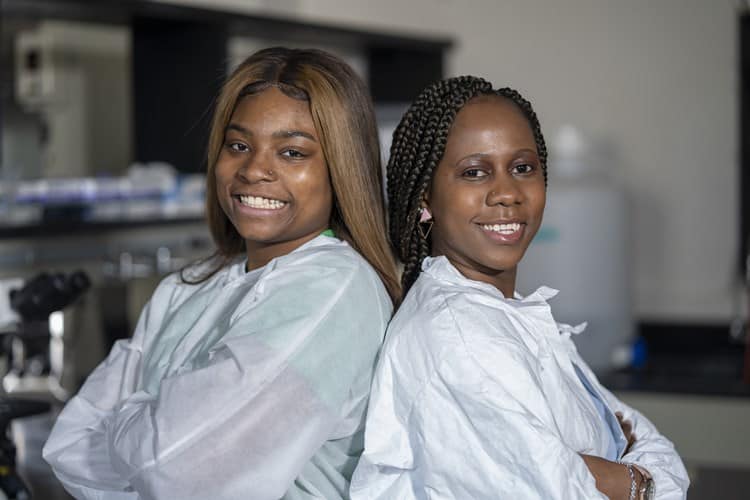
As one of the top research universities in the world, Michigan State University pushes the boundaries of discovery to solve pressing global challenges through research—from impacting malaria patient outcomes to studying causes of lupus.
For two juniors in MSU’s Biomedical Laboratory Diagnostics (BLD) Program—Rachael Nassimbwa and Shamya Harris—undergraduate research brought an opportunity to travel and present research projects to fellow undergraduates from around the country.
Nassimbwa spent last summer in Malawi, working in a research laboratory studying malaria.
“I worked on a project to develop a quantitative assay for determining parasite load among malaria patients, to enable better prognosis and patient outcomes, as well as reduce cases that progress to cerebral malaria,” Nassimbwa said. “This research will improve patient care among malaria communities.”
After returning to Michigan State, Nassimbwa applied to present a poster on her research to Harvard. She was subsequently selected to present at the 2020 National Collegiate Research Conference at Harvard University.
“It was an interesting experience to interact with fellow undergraduates involved in research at their respective universities,” Nassimbwa said. “This motivated me to continue pursuing my interests in the science field. It enlarged my network and I met prominent scientists such as Dr. George Church and Dr. Jeremy Berg, among many others.”
Harris’s undergraduate research focuses on lupus.
“Lupus is a devastating systemic autoimmune disease that preferentially affects young black women, who are reported to have a higher fatality rate than their white counterparts,” Harris said. “We have demonstrated that intranasal instillation of lupus-prone NZBWF1 mice with crystalline silica accelerates systemic autoimmunity and glomerulonephritis. Notably, these effects were prevented when mouse diets were supplemented with DHA, an omega-3 polyunsaturated fatty acid found in fish oil supplements.”
Harris received funding from MSU and the Annual Biomedical Research Conference for Minority Students (ABRCMS) to attend and present at this year’s conference in Anaheim, Calif.
“The experience was great! I had a chance to present my poster and make lifelong friends with underrepresented students like me who participate in research all over the country. I was also able to interact with many scientists and get advice on how I could make my journey to medicine the best possible.”
Both Nassimbwa and Harris understand the value of participating in undergraduate research.
“During my time in Malawi, I learned a lot about conducting research and how relevant it is to participate in cutting-edge research to acquire solutions for various medical challenges,” Nassimbwa said.
“Participating in this research has allowed me to approach systemic lupus from a scientific view,” Harris added. “I have also learned the importance of journal club meetings and participating in research conferences, which are key aspects of gaining knowledge on scientific research. This research has enhanced my curiosity and I am driven to ask more questions than ever before.”
Both students continue to participate in undergraduate research. Harris remains active in researching lupus, while Nassimbwa, staying true to her interests in infectious diseases, is currently studying HIV.
by Barret Baxter, Communications Manager, Biomedical Laboratory Diagnostics Program
Text courtesy of MSU College of Natural Science. Please visit https://natsci.msu.edu/news/undergraduates-gain-experience-through-research-projects/ to view the original article.
Founded in 1978, the Council on Undergraduate Research (CUR) focuses on providing high-quality and collaborative undergraduate research, scholarly, and creative activity. Among the many activities and networking opportunities that CUR provides, the organization also offers support for the professional growth of faculty and administrators through expert-designed institutes, conferences, and a wide-range of volunteer positions. The CUR community, made up of nearly 700 institutions and 13,000 individuals, continues to provide a platform for discussion and other resources related to mentoring, connecting, and creating relationships centered around undergraduate research. CUR’s advocacy efforts are also a large portion of its work as they strive to strengthen support for undergraduate research. Its continued growth in connections with representatives, private foundations, government agencies, and campuses world-wide provides value to its members and gives voice to undergraduate research. CUR is committed to inclusivity and diversity in all of its activities and our community.
CUR focuses on giving a voice to undergraduate research with learning through doing. It provides connections to a multitude of campuses and government agencies, all while promoting networking and professional growth to its community.


